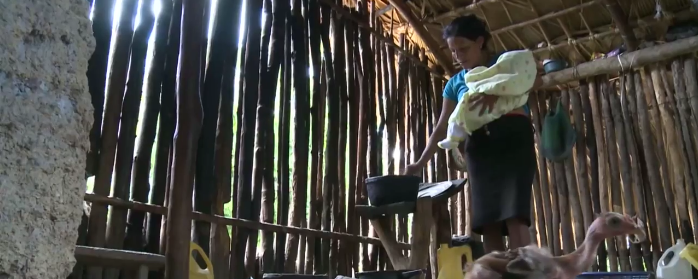One of the worst droughts on record plagues Guatemala

Guatemala is experiencing one of the worst droughts in its recent history. 1.3 million people have been affected, and approximately 720 000 are encountering severe food insecurity.
The inhabitants of the Central American 'dry corridor' – an area affected by extreme weather hazards extending from southern Mexico to Panama – depend primarily on subsistence agriculture and temporary employment in the coffee sector. After three years of strong climatic variations and the coffee rust infestation which has affected coffee plantations in Central America since 2012, residents are currently experiencing an unprecedented drought caused by the El Niño phenomenon.
According to Guatemala's authorities, about 175 000 households living along Guatemala's dry corridor have lost between 50 and 100% of their corn and bean crops. At least 25 districts have experienced food insecurity, and the crisis will continue to affect at least one million people until the next crop between June and August 2016. Experts have announced that the effects of El Niño and this year's rainfall deficit could last for another few weeks.
The assistance from the European Commission was delivered mainly in the Huehuetenango, Quetzaltenango, Quiché, Alta and Baja Verapaz and Chiquimula departments. Three main criteria applied for its distribution: the size of the family; the presence of breastfeeding women, children under five or people with disabilities; and lack of food reserves. Families with acutely malnourished children were also prioritised. Training in soil and water conservation methods and in implementing better agricultural practices to protect food security were also part of EU-funded actions in the area.

Video credit: CCTV America
Families in need
Felipa and Jesús, parents of four children and expecting their fifth, live in the Jocotá district, in the department of Chiquimula. When Jesús is employed, he can only earn 30 quetzales a day (less than €4), which enables him to buy a few pounds of corn. In early June 2014, they sowed six 'tareas' of corn (approximately a third of a city block). Unfortunately, they lost nearly the entire crop, which meant that they had to eat the few remaining food reserves and reduce the number of daily meals.
Thanks to the European Commission’s Humanitarian Aid and Civil Protection department (ECHO), Felipa and Jesús received a €90 money transfer that enabled them to buy corn, beans, sugar, oil and soap.
“The financial aid is enough for about 15 days, but I feel happy because we will get more help later on, as there is no work in our community and there are days when we earn nothing," said Felipa, after receiving her first cash transfer.
Antonio Poou and Margarita Velásquez's family also received assistance from the European Commission. They live in a village called Union Barrios, in the Salamá district, with their six children. The three oldest (24, 19 and 15 years old respectively) are disabled. Their lack of economic resources has not only prevented their children from getting the necessary assistance but has also affected the younger children by depriving them of access to education.
Antonio works hard to take care of his family. As a day labourer, he earns 40 Quetzals (less than €5) but complains that there is not always work as their income depends on the cultivation of corn. Over the last three years, the family has only been able to pick three bushels of corn. With support from the European Commission, the Poou Velásquez family received two instalments of €90, enabling them to buy food.
María Isabel López Lucas also received financial help to improve her food security. She is an indigenous 'Mayan Mam' (a Native American people of the Maya civilisation) from the Huitan district in the department of Quetzaltenango. She is the mother of two children and works as an agricultural labourer, sowing corn, squash and beans to feed her family in just under two acres lent to her at no cost by her neighbour.
Data provided by Guatemala's food security authority show that another 154 000 families in the Guatemalan dry corridor suffered food crisis and are in need of assistance.
Sources: The European Commission, Humanitarian Aid and Civil Protection
Featured image credit: CCTV America

Commenting rules and guidelines
We value the thoughts and opinions of our readers and welcome healthy discussions on our website. In order to maintain a respectful and positive community, we ask that all commenters follow these rules.